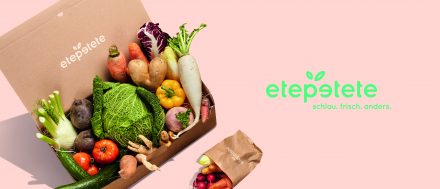Sometimes you just need an aha-moment to get an idea going. That was the kind of moment Carsten Wille experienced back in 2014 while talking with a supermarket employee about the amount of food wasted every day. According to a study by the German Consumers’ Organization, 11 tons of food valued at approximately 25 billion euros end up in the trash every year. Manufacturers, the retail market and the agricultural industry are responsible — and of course consumers as well. After all, consumers are used to finding nothing but flawless produce at supermarkets.
A second chance for less-than-perfect vegetables
So what actually happens to the fruit and vegetables that don’t comply with standards in terms of shape or color and therefore never make it to a store? After his first discussion in the supermarket, Carsten Wille conducted some research with organic farmers and found out that a large amount is simply left in the fields. It might also be used for a completely different purpose such as energy production in biogas plants.

Yet in Wille’s opinion, curved cucumbers, two-legged carrots and jumbo zucchini should be given a second chance. Which is why he and his former schoolmates Christopher Hallhuber and Georg Lindermair founded the food startup etepetete in 2014. Wille and Hallhuber gave up their business studies for the startup, and Lindermair quit his job as a real estate agent.
The vision: going larger scale with etepetete
The three founders made the right decision: Since 2015, the Munich startup has been delivering its organic boxes full of “ugly” produce to its customers. etepetete has now even become the leading supplier in the organic box market to deliver all over Germany — which sets them apart from other organic box suppliers that only provide regional services. Wille commented:
“Most organic boxes around are limited to a small radius. However, we would like to appeal to a wider clientele and supply as many individuals as possible with healthy organic produce, which is why we decided to go larger scale with etepetete. That was our vision from the very beginning, and we are thrilled not only about being so widely accepted on our home turf in Munich, but also that our boxes are delivered throughout Germany each week.”
How etepetete’s service works: Customers order a “rescue box” directly on the company website and select a delivery interval. The boxes start at 20 euros for roughly 5 kilos and are filled either with vegetables or fruit – or with both.
From Munich to the rest of Germany
etepetete boxes are packaged in a warehouse at the Wholesale Market Munich. Incidentally, etepetete was the first food startup to move into its own warehouse at the Wholesale Market Munich.
The boxes are then transported to customers using carbon-neutral shipping. Although the system is not regional for all parts of Germany, its advantages are clear for Wille:
“This system allows us to bypass all of the middlemen that normal supermarkets cannot avoid. We buy directly from producers, package the fruit and vegetables ourselves and ship directly from Munich to the rest of Germany.”
Wille does state that they are planning to add other logistics sites to provide even shorter transportation routes in the near future.
The boxes are filled solely with fruit and vegetables from organic farms that sell their crops to the Munich startup. According to etepetete, they purchase the non-standard products at the regular price.
To date it is not possible for customers to select what kinds of fruit and vegetables are shipped each week — but that should become a future option, limited only by the current seasonal and regional availability.
So how is business going?
“Since founding the company, our customer base has consistently grown, and we are working on launching new types of boxes. Unfortunately, we can’t give any exact numbers, but we do send out a five-digit figure of boxes each month,”
shared Wille. In total, however, an estimate of more than 250,000 boxes have been delivered to customers across Germany. The increasing demand is also reflected by the size of the team, which grew from 20 to roughly 40 employees in the past year.
Work right at the spot where food is being wasted
Despite positive developments, the founders are still motivated by the idea that started it all: fighting food waste. Or rather: do more!
“We want to work right at the spot where food is being wasted: in the actual fields. Together with partner farmers, we would like to plan our own fields, because we know the exact amount needed for our customers. Our approach is different from that of a supermarket, and we can plan more precisely. That means we will not even let it get to a point where it would be necessary to destroy fruit or vegetables.”




